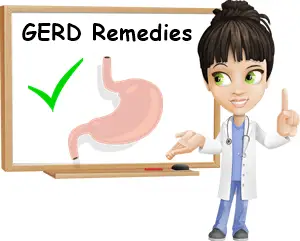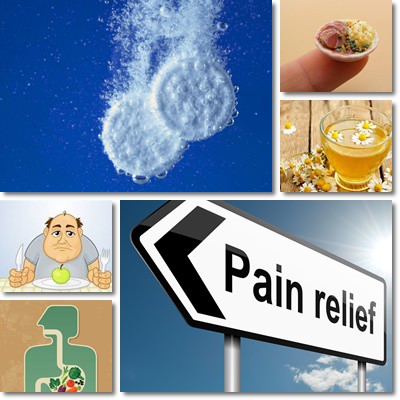Gastroesophageal reflux disease is not just occasional acid reflux and heartburn from eating pizza or a heavy steak. It’s a complex condition and consists of both typical and atypical symptoms brought on by a variety of causes, some more surprising than others.
As a result, managing or treating it can prove problematic for many people up until a certain balance is achieved.
Factors such as physical abnormalities, stress, bad eating habits, poor lifestyle choices should be taken into consideration when attempting to cure gastroesophageal reflux disease.
Treating acid reflux disease takes time because we can’t really say we are cured when our symptoms have barely disappeared or just become less intense.
We need to let our esophagus heal as well and this takes time. Making the necessary changes to relieve GERD symptoms such as acid reflux or heartburn is the first step towards healing, but it involves us making changes on more than one level.
From improving our eating to giving up harmful habits such as smoking, coffee or alcohol consumption, treating gastroesophageal reflux requires a lot of effort from our part.

Treating GERD often presupposes taking antacid medication, but also making important dietary and lifestyle changes. In rare cases, gastroesophageal reflux disease is treated with the help of surgery.
Treatment options depend on the severity of the condition and its impact on daily life. GERD sufferers may respond differently to medication, react differently to various dietary changes, while some may even suffer complications of the disease.
All of these factors are to be taken into account when looking for the best treatment options for each and every one of us.
But the first and most important thing we must do is see a doctor for diagnosis. Only a trained medical professional is qualified to properly assess such as disease and, based on his or her findings, advise us with regard to the best treatment options for us.
When looking to cure GERD for good, there are three important aspects:
1) Diet.
2) Lifestyle.
3) Medication.
Gastroesophageal reflux disease diet
There are certain foods we need to eat and certain foods we need to avoid for acid reflux disease. Sometimes, dietary and lifestyle changes are quite enough to stop GERD for good. But while some problematic foods are common for most GERD sufferers, others are not.
Each and every one of us has a particular food intolerance or sensitivity that may aggravate the condition for us, but it’s possible that food is a trigger only for us.

What foods to eat for gastroesophageal reflux disease?
There aren’t really any ideal or good foods to eat when we have full blown acid reflux disease, but there are some which require little effort to digest and don’t really work up the stomach, thus helping us prevent or keep symptoms under control.
The best foods you can eat when your GERD is acting up are bland foods eaten plainly, preferably boiled, steamed or grilled, in small amounts at once.
1) White rice or white pasta.
2) Baked or boiled potatoes, carrots or other root vegetables.
3) Ripe bananas, pears (without skin), berries or watermelon.
But keep in mind that any fruit may trigger acid reflux for anyone.
4) Bread, toast, crackers or pretzels.
5) Boiled, steamed, baked or grilled mushrooms.
6) Boiled or steamed spinach, maybe also chard, sorrel, patience dock.
Or other leafy greens you tolerate well.
7) Boiled or baked chicken meat and fish.
8) Applesauce, baked apples.
9) Still water (it washes down stomach acid).
10) Herbal teas to soothe the stomach.
Important. It might not be best to eat fresh fruits or raw vegetables because they may promote stomach acidity. White rice, bread and crackers are plain and tend to absorb the acidity. Look for foods that are easy on the stomach.
What foods and beverages to avoid for gastroesophageal reflux disease?
Basically avoid everything that makes you feel bloated, nauseated or is difficult to digest, too spicy, too aromatic, too fragrant, sour or piquant.
Common foods and beverages that may bring about symptoms include:
1) Alcoholic beverages.
2) Coffee and caffeinated beverages.
3) Green tea, black tea, white tea, other theine and caffeine-rich options.
4) Dark chocolate and milk chocolate too.
5) Citrus fruits, except maybe acidless orange varieties.
6) Fried foods.
7) Fatty or oily foods.
8) Milk, fermented or aged dairy products (mozzarella, butter, buttermilk).
9) Onion, garlic, leek etc.
10) Cabbage, cauliflower, broccoli etc.
11) Dried bean varieties (not in everyone).
12) Spicy foods: ginger, turmeric, pepper, chili peppers etc.
13) Tomatoes, tomato juice, sauce, ketchup.
14) Fizzy drinks, soda, energy drinks.
15) Chips, crisps, junk food in general.
16) Peppermint, spearmint, mint.
17) Carbonated water.
18) Other: bell peppers, pineapple etc.
Generally, boiling or baking foods makes it easier for the stomach to digest them.
Fiber rich foods such as beans may create air and cause burping, which allows to stomach acids to escape into the esophagus.
Foods such as cabbage or cauliflower, although extremely health, may promote bloating and cause similar issues. For me, the littlest amount of coffee, sweet carbonated beverages or even carbonated water sometimes can trigger an overwhelming acidity.
Other GERD tips
Gastroesophageal reflux disease lifestyle advice.
Here is what specialists recommend:
1) Eating small meals often rather than large meals infrequently.
2) Eating at least three hours before going to bed.
3) Maintaining an upright position following all meals until digestion is at least halfway through.
4) Walking to ease heartburn and acid reflux (great particularly after eating). Gravity plays the most important part here as it prevents stomach content from rising into the esophagus.
5) Maintaining a healthy weight (excess weight encourages GERD).
6) Avoiding tight clothes around the stomach areas. They may cause constriction and pressure and encourage stomach contents to go up into the esophagus).
7) Sleeping with head and upper part of the chest elevated to keep stomach contents down (this is particularly efficient for people whose GERD is caused by physical abnormalities).
8) Avoiding strenuous physical exercise or lifting heavy weights, especially after eating.
9) Quitting smoking.
10) Avoiding alcohol.
Gastroesophageal reflux disease medication
Both occasional stomach acidity and gastroesophageal reflux disease can be successfully treated with the right medication, but the secret to success is taking it as prescribed.
The most commonly used medicines include:
1) Antacids.
2) Proton pump inhibitors.
3) Motility medication.
4) H2 antagonists.
1.Antacids (Maalox, Riopan, Rolaids etc.)
Antacids (Maalox, Riopan, Rolaids etc.) basically neutralize stomach gastric acid so reflux doesn’t occur.
Antacids are usually taken following a meal, roughly when digestion begins and the first symptoms of GERD appear (30 to 60 minutes after eating).
Nevertheless, their action is short-lived and reflux may occur unless we take them again after we eat, meaning they only prevent symptoms, not treat the underlying cause, acid reflux.
Antacids may be aluminum, magnesium or calcium carbonate based and often produce side effects such as diarrhea or constipation. They are recommended for occasional use.
2.Proton pump inhibitors
Proton pump inhibitors (omeprazole, esomeprazole) reduce the stomach’s production of gastric acid.
They have a prolonged action and are often prescribed for long term use (several weeks) to allow affected mucosas to heal.
Proton pump inhibitors are prescribed for gastroesophageal reflux disease, indigestion, peptic ulcer etc. However, they may cause side effects such as nausea, constipation, diarrhea, fatigue, even depression, anxiety and dizziness.
Proton pump inhibitor medication have been found to promote vitamin and mineral deficiencies, particularly calcium, magnesium, iron and vitamin B12 deficiencies and long-term use or overuse can lead to frail bones, fractures, osteopenia and osteoporosis, depression etc.
3.Motility medication
Motility medication stimulates motility (the regular contraction and relaxation) of gastrointestinal muscles in the esophagus, stomach, intestines.
This encourages normal digestion, preventing delayed stomach emptying which is believed to favor acid reflux. They also strengthen muscles, especially those that close up the junction between the stomach and the esophagus (where acid may escape).
4.H2 antagonists
H2 antagonists basically block histamine production in the stomach walls. This results in reduced stomach acid production and contribute to gastroesophageal reflux management and treatment.
However, keep in mind that medication, even as simple as that for acid reflux, is best taken at your doctor’s recommendation and according specific guidelines for best results and minimum side effects.
Gastroesophageal reflux disease alternatives: surgery. While it may be an option, laparoscopic anti-reflux surgery is only recommended to people whose GERD is triggered by physical abnormalities (see gastroesophageal reflux disease causes) and thus cannot be treated in a traditional manner.
The rest of us will benefit more from choosing the harder way and making the necessary dietary and lifestyle changes that are required to manage and treat the condition.
Conclusion
Managing and treating gastroesophageal reflux disease (acid reflux disease) is a complex approach. Making the necessary dietary and lifestyle changes is just as important as taking the adequate medication and thus achieving a balance between preventing, managing and treating the condition. Above all, it takes time both to undo the damage done to sensitive mucosas and to learn to eat and live right so we don’t encourage the disease further.
